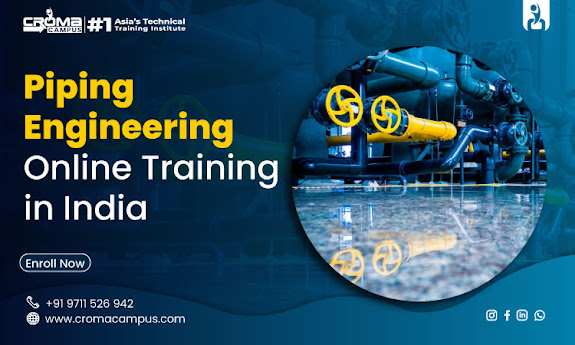Explain the role and salary of a Piping Engineer
Introduction
In the world of engineering, where the harmonious convergence of science, innovation, and practicality intertwines, the role of a piping engineer stands as an integral and important pillar in assuring the successful realization of complex industrial projects. In the present scenario, Piping Engineers play a pivotal role in the design, installation, maintenance, and optimization of piping systems that serve as the circulatory systems of industrial facilities. Furthermore, if you also wish to turn into a skilled Piping Engineer, obtaining a Piping Engineering Course Online in India will be helpful for your career in knowing every aspect.
Further, let’s now have a look at the multifaceted responsibilities of a piping engineer and shed light on the compensation that accompanies their demanding yet rewarding profession.
Understanding the Role of a Piping Engineer
At its core, a piping engineer is responsible for the intricate design, analysis, and execution of piping systems that transport fluids, gases, and other materials within various industries, like- petrochemicals, pharmaceuticals, power generation, and manufacturing. Their expertise is indispensable in ensuring the efficient and safe conveyance of these substances while adhering to stringent industry standards and regulations.
What a Piping Engineer is supposed to do?
A piping engineer’s role can be broadly categorized into several key functions:
Design and Layout
Piping engineers are tasked with creating detailed designs and layouts for piping systems that account for factors such as pressure, temperature, flow rate, and the nature of the transported materials. They collaborate with multidisciplinary teams, including process engineers, mechanical engineers, and structural engineers, to develop comprehensive designs that seamlessly integrate with the overall plant layout.
Material Selection
The choice of materials for piping systems is crucial to their longevity and safety. Piping engineers must consider factors like corrosion resistance, compatibility with transported substances, and cost-effectiveness when selecting materials. This involves a deep understanding of metallurgy and material science.
Stress Analysis
Piping systems are subjected to various stresses, including thermal expansion, pressure, and external forces. Piping engineers employ sophisticated software tools to perform stress analysis, ensuring that the systems can withstand these forces without failure, leakage, or compromise in safety.
Safety and Compliance
Safety is paramount in industrial settings. Well, these engineers work diligently to ensure that the piping systems they design adhere to industry codes and regulations. They take into account safety measures to prevent leaks, minimize potential hazards, and provide proper ventilation for hazardous materials.
Project Management
In a way, Piping engineers often take on project management roles, coordinating with different teams to ensure that the piping aspects of a project are executed within the specified timelines and budgets. Effective communication and collaboration are essential to the success of these endeavours.
Piping Engineering Salary Structure
The compensation of piping engineers reflects the specialized nature of their role and the level of expertise required to perform their duties effectively. Several factors influence the salary of a piping engineer:
- As with many professions, experience plays a significant role in determining a piping engineer’s salary. Engineers with several years of hands-on experience and a proven track record of successful projects often command higher compensation packages.
- Piping engineers typically hold bachelor’s or master’s degrees in mechanical engineering or a related field. A strong educational foundation contributes to their understanding of engineering principles and their ability to tackle complex challenges, which can impact their earning potential.
- The industry in which a piping engineer works can influence their compensation. Industries such as oil and gas or chemical manufacturing tend to offer higher salaries due to the demanding nature of their operations. Additionally, the geographical location of employment also plays a role, with engineers in regions with a higher cost of living generally earning more.
- Piping engineers who take on managerial roles, oversee larger projects, or have responsibilities beyond design, such as project management or team leadership, often receive higher compensation due to the added responsibilities and expertise required.
- Furthermore, certifications like Professional Engineer (PE) or relevant industry certifications can significantly enhance a piping engineer’s earning potential. These certifications validate an engineer’s expertise and their ability to meet industry standards.
Conclusion
The listed information explains the role of a piping engineer which is an intricate amalgamation of science, creativity, and practicality, where they translate abstract concepts into tangible, functional systems that power industries. Their work ensures the safe and efficient transport of vital substances that drive our modern world. The compensation of piping engineers is a reflection of their expertise, experience, and the critical nature of their contributions to various industries. As technology continues to evolve, and industries push the boundaries of innovation, the role of piping engineers will remain indispensable, and their compensation will continue to reflect the value they bring to the table. So, do acquire its in-depth information, and Piping Engineering Course Fees, to professionally get started in this direction.



Comments
Post a Comment